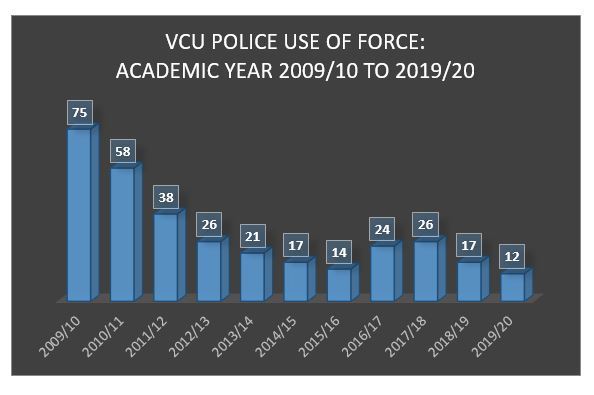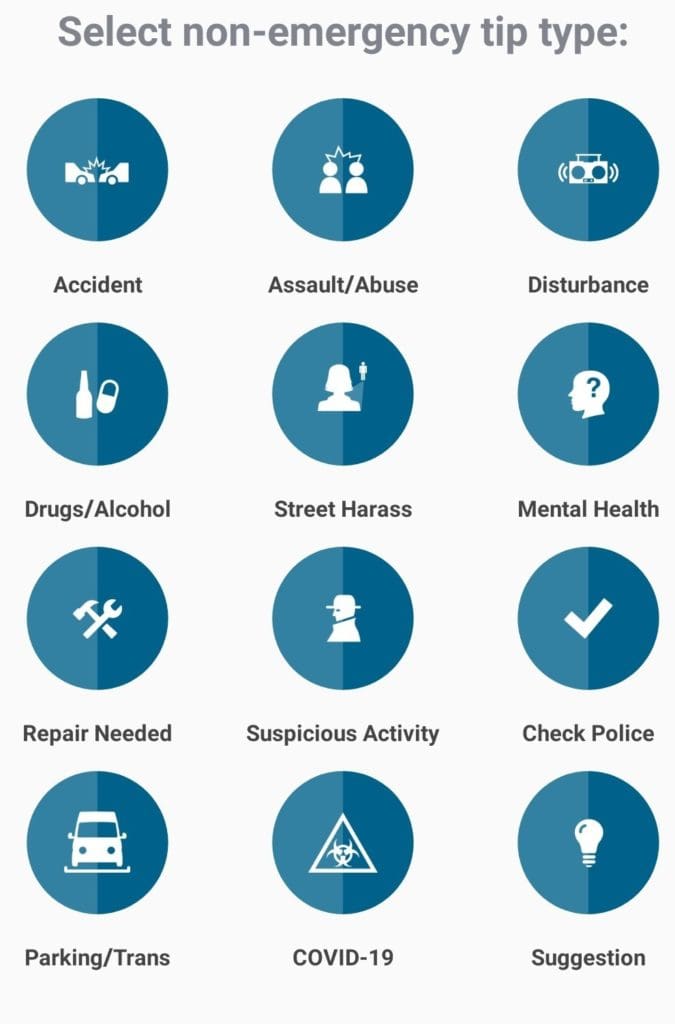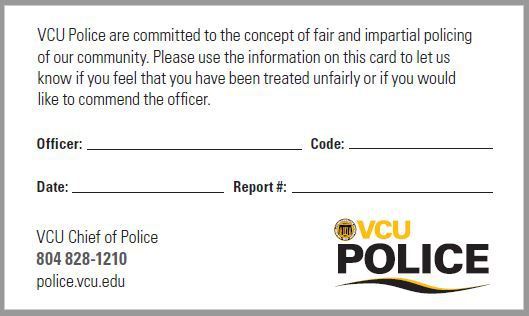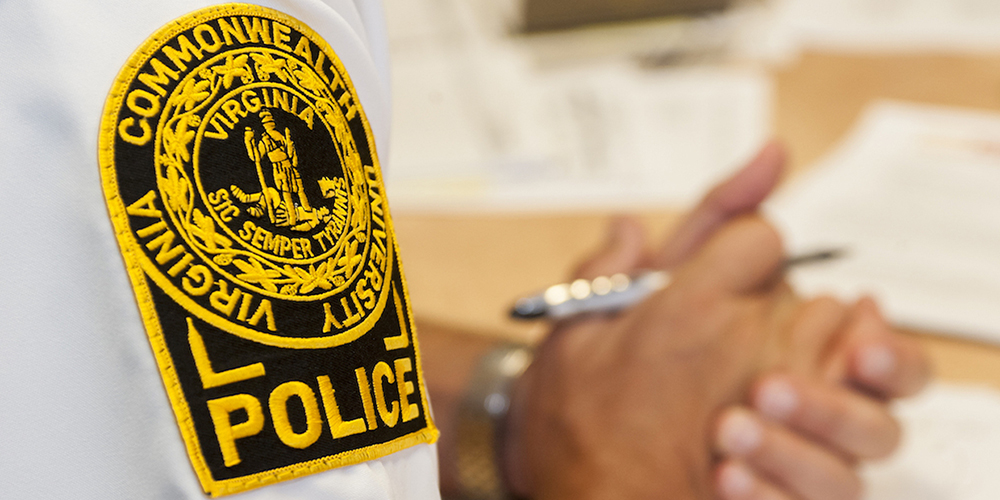As discussions about police reform have been dominating the national conversation over the years, Virginia Commonwealth University (VCU) Police Department leaders reviewed past and present efforts to better meet the community’s public safety needs.
One piece of data that stood out was that during the 2019-20 academic year, VCU Police recorded the lowest number of officer-involved use-of-force incidents in the past 10 years.
When VCU Police Chief John Venuti started in 2010, he directed staff to tally and track use-of-force reports. In 2009-10, the department had 75 incidents. As of July 31, that number was down to 12 for the previous academic year — an 84% reduction.
“Clearly, three factors are critical to successful policing in the 21st century: police legitimacy, de-escalation efforts and police accountability,” said Venuti, the university’s associate vice president for public safety and former Campus Safety Director of the Year winner. “VCU Police have consistently looked at ways to reduce use-of-force and increase efforts by officers to de-escalate situations.”
In 2015, VCU Police used President Barack Obama’s Task Force Report on 21st century policing as a road map for reform. That same year, with officers continuing to use force less often than in 2010, Venuti moved ahead with policy revisions to keep reducing the count.
The revised policy outlines when officers use force and emphasizes that minimal force should be used, if required. VCU Police updated it again in 2017.
Today, officers take part in Fair and Impartial Policing training to address implicit and explicit biases. They also complete training for diversity awareness and de-escalation techniques.
“Back in 2015, we implemented many of the changes to our use-of-force policy that America is now calling for following the — what I would consider absolutely preventable — death of Mr. George Floyd in Minneapolis,” Venuti said. “We require officers to intervene to stop excessive force and there is a duty to report excessive force. We do not allow chokeholds and our policy clearly defines the use-of-force continuum as well as requires officers to de-escalate unstable situations.”

A graph showing the use of force for each academic year and the decline over a decade. In academic year 2009-10, there were 75 incidents in which VCU officers used force. In the 2019-20 academic year, there were 12 incidents.
Purposeful Ideas
In other areas of policing, Venuti has pushed a philosophy that he refers to as “policing with a purpose.”
The philosophy encourages officers and staff to focus on how they can use resources to proactively solve issues in the community instead of reacting once a problem has become unmanageable. The department relies on community feedback to help keep students, faculty, staff and visitors safe and uses innovation and partnerships to identify and solve problems.
Shortly after Floyd’s death in late May, VCU alumnus Terry Everett contacted VCU Police. Everett, a 2019 College of Humanities and Sciences graduate who is preparing to apply to medical school, had worked with VCU Police as a student and said that while he had a close relationship with the department and interacted with officers, he also realized that “persons of color do not feel safe around police.”
“I really wanted to help and be a part of the voice of change,” Everett said.

The LiveSafe app tip screen with the Check Police option on the right side.
He had the idea to create a channel for those being stopped by police, or bystanders, to intervene in a situation they may feel is escalating, or in which an officer is acting improperly. With Everett’s support, VCU Police implemented a “Check Police” button on the LiveSafe app. When users click this tip option in the app and report concerns about an officer’s conduct, police supervisors can intervene in real-time. (Users can send information anonymously.)
Once someone enters a tip, VCU Police dispatchers, who monitor LiveSafe around-the-clock, receive it immediately. Protocol mandates that dispatchers check in via radio with the officer and send a police supervisor to the scene to ensure that officers are properly handling an incident or traffic stop. All data associated with the tip submission is documented and stored.
“If a bystander sees something they don’t like, they can have contact with a [police] supervisor so the supervisor can ask if the officer is following protocol,” Everett said. “It’s a way to make students feel safer … so that incidents don’t get mishandled, and backup comes sooner.”
Everett said that nobody should feel like they’re being targeted by police.
“There’s a sense of helplessness when you don’t know who exactly to call. Sometimes bystanders would think, ‘why would I call more police?’ but [this lets] students be connected to a higher authority.”
Stop Cards for Patrol Officers
In 2019, Venuti was looking for a way to gather feedback from community members after they were stopped by VCU Police officers. He developed stop cards — business cards that included an officer’s information, along with department contact information.
Officers began issuing stop cards last August anytime they stopped someone. Stops include traffic stops or could occur when an officer is on foot patrol and speaks at length with someone.

A VCU Police STOP card with space for the officer’s name, code, the date and report number.
Venuti said the cards demonstrate the department’s commitment to fair and impartial policing.
“People can let VCU Police leadership know if they felt like they were treated unfairly, or would like to commend an officer,” he said.
Since this initiative began, officer commendations increased by 50% in the 2019-20 academic year compared to the prior year. Police believe the increase was related to officers handing out stop cards.
VCU’s L. Douglas Wilder School of Government and Public Affairs is working with VCU Police to review all stop card responses and compile summaries of the data.
With these changes in place, the work to implement police reform continues. In June, VCU President Michael Rao, Ph.D., issued a list of police reform initiatives for VCU Police to continue or implement in the 2020-21 school year. The university also launched an independent Safety and Well-being Advisory Committee to help inform a new safety model for VCU.
“We welcome police reform and my officers and civilian staff are very mindful about this movement in society,” Venuti said. “One officer asked to facilitate group discussions to have difficult, but necessary, conversations about racial issues. Officers of different backgrounds want to better relate to each other and community members. We will continue to welcome feedback in any way we receive it and will deliver high levels of transparency and accountability as we work through reforms and manage safety.”
Corey Byers joined the University Public Affairs staff as the public relations specialist for VCU Police in March 2014. She can be reached at [email protected]. This article was originally published in 2020 and has been edited. The practices suggested in this article still apply.













